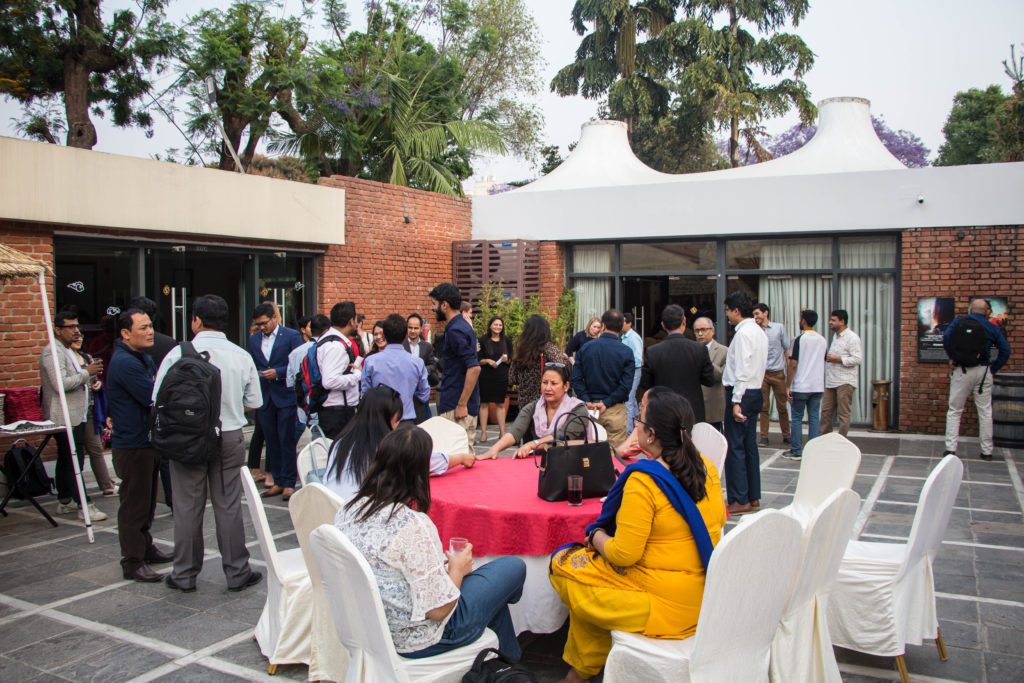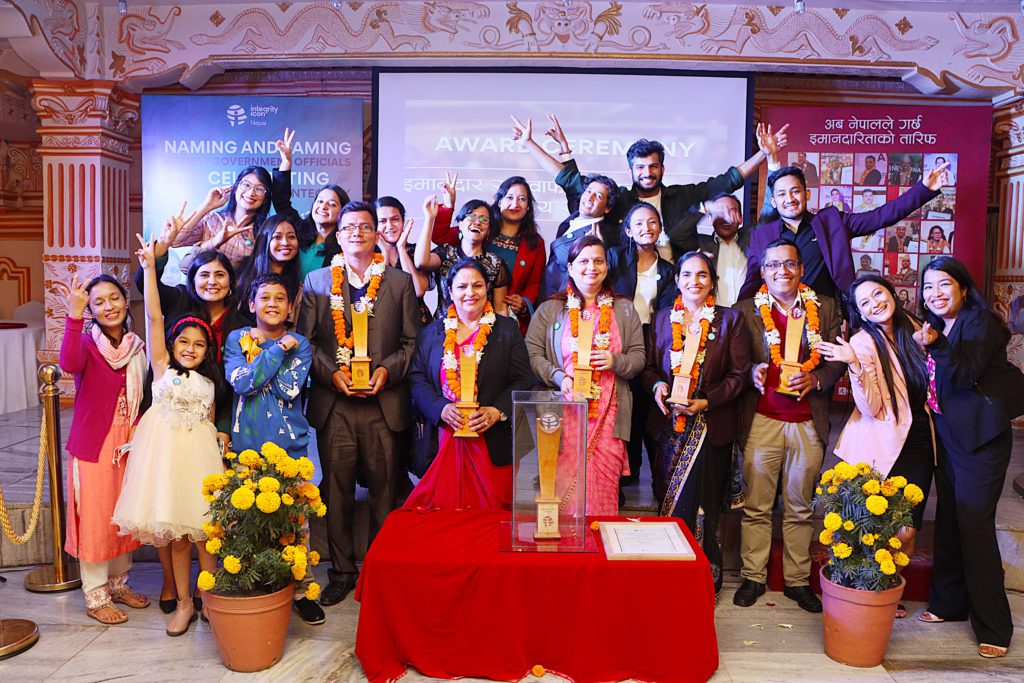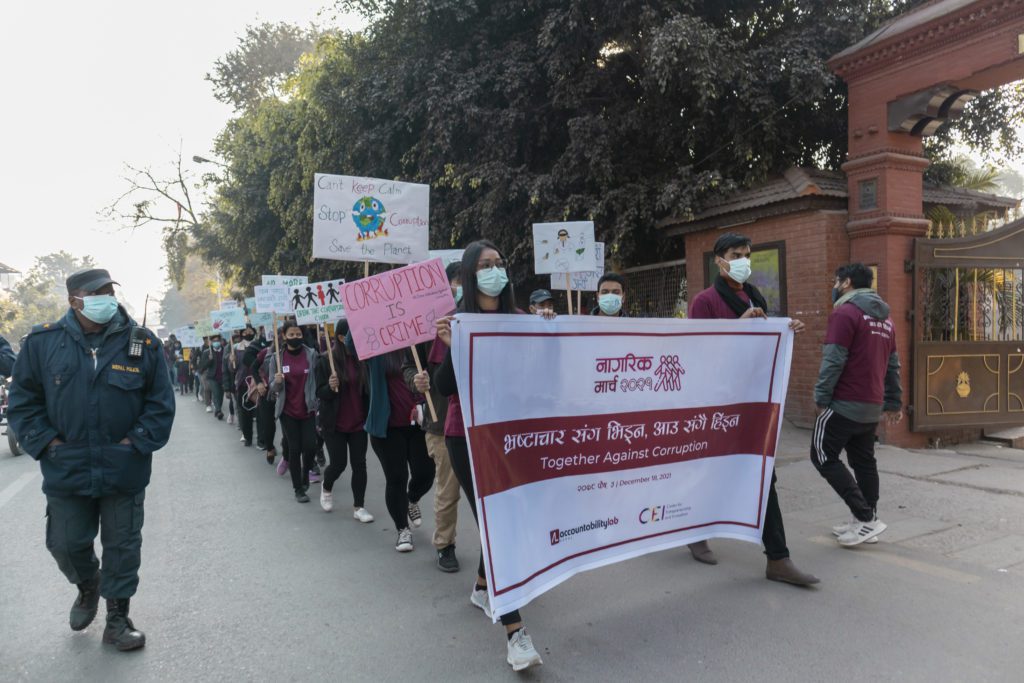NEWS
November 30, 2022

IN BRIEF
Our team at Accountability Lab Nepal are celebrating the organization’s […]
SHARE
Our team at Accountability Lab Nepal are celebrating the organization’s 10th anniversary by reflecting on some of our key learnings. We feel that our greatest impact is in how much we learn and how much our learning culture has helped us to catalyze changes in Nepal by influencing decisions, shaping opinions and role modeling behaviors.
We’ve tested creative ideas as we have mobilized around accountability issues through campaigns; equipped reformers within and outside government with skills, knowledge and tools to push for better governance; and influenced policies, process and practices by building ecosystems in communities.
Despite challenges in the past decade in Nepal, including shrinking civic space, rising threats to democracy, efforts to undermine institutions, and negative perceptions towards non-profit organizations focused on anti-corruption efforts, we feel we have built trust in our work. We believe this is because of the Lab’s unique approach to building positive narratives, working with unlikely networks and focusing on feedback, learning and adapting.
In this spirit, here are 10 learnings which have helped us evolve over the past decade:
1. People First – investing in team members is essential as an organization is defined by its people
The success of an organization is defined by its team. One of the keys to having a strong team is investing in individual growth and team building. The role of an institution is to create an environment for team members to explore their potential within and beyond the organization and to enhance their leadership qualities. As a growing organization, we faced a series of ups and downs including external and internal crises such as funding crunches, earthquakes and the Covid-19 pandemic. Despite the crises, the majority of our staff remained part of the Lab and took ownership of the Lab’s goals. With a well-equipped, strong and flexible team, we have thrived in the last decade. It is not just about recruiting people with the right skills, but also about bringing together people who share the same values as the Lab and act with integrity. Our team learns constantly from each other, builds on each others’ strengths and motivates each other to go the extra mile.
“ALN is my second home,” says Nitee Shrestha, who has been with the Lab for the past five years. She adds, “I started as an intern here and I am provided with constant mentorship and opportunities to groom myself as a youth leader. I particularly appreciate the working environment here as there is a good balance between vertical and horizontal leadership and everyone gets to take charge of their responsibilities.”
2. The Power of Networks – unlikely networks can catalyze significant reforms
It is necessary for people from all walks of life—government representatives, activists, artists, media, academics and entrepreneurs—to be involved in promoting accountability. At ALN, we have observed that the more we diversify our network, the more opportunities we find for innovation, collaboration and collective advocacy. For example, we have been collaborating with Onion Films on our Accountability Film School through which we have trained more than 300 young people [more than 80% of them are women] to raise their voices on accountability issues through visual story-telling. These films have been showcased on various national and international platforms and have raised important debates. They have also been used as a tool for advocacy by other civic leaders and changemakers. Throughout this process, we have engaged a diverse cohort of young people in governance dialogues, slowly expanding the community of accountability advocates.

3. “Friendraising” over Fundraising is important for an organization’s growth
At ALN, we spend half of our time making friends, tightening our relationships and boosting synergies. All of our team members allocate a significant portion of their time to reconnecting with existing networks and meeting new people, organizations, and communities. We share our progress, contribute where possible, and collect ongoing feedback. For instance, through our Civic Action Teams, our Community Frontline Activists (CFAs) have collaborated directly with 20 local government units, many of whom were initially hesitant, to close the feedback loop on pertinent accountability issues including fiscal budgets, labor migration, gender, public-private partnerships and COVID-19 misinformation. This would not have been possible without spending time with local government representatives to jointly understand their needs and challenges, and identify areas for collaboration. We are also lucky to know many people who provide financial and non-financial support to allow us to fulfill our commitments with honesty, and introduce us to others with whom we can partner.
4. Collective Trust – collaboration is the key to building trust in communities
It is important to understand and acknowledge that there can be diverse problems in communities that require different skill sets. For instance, while we work towards enhancing local government accountability on issues related to labor migration, we are not in a position to provide direct support to the community members. However, we are able to connect them with other organizations in our network that can provide the support they need. For instance, watch the story of Jhamka Bahadur Gurung, a returnee migrant worker who received compensation from the government for the treatment of his kidney failure with the help of our CFA and local networks. Creating a resolution channel with network organizations to help solve such issues has been the key to building trust in our communities.
5. Flipping the Script – Naming and faming is more effective than naming and shaming
Some of the most important feedback we receive from communities is about appreciating the do-gooders who we hold up as role models in our campaigns. The existing negative media and political environment can sometimes be discouraging to those who really want to bring change. After we recognized our Integrity Icons and COVID Heroes, these winners have shared that they were appreciated in their communities for their efforts and this has motivated them to do more. Now, young people who are in the government indicate that they are also inspired to bring about positive change and are joining us to create a support system to institutionalize reforms in their agencies. When we started Integrity Icon in Nepal, it was just an idea. Now it is a powerful tool to shift narratives around corruption and reforms within public administrations around the world.

6. Build from the Bottom-Up – Investing in local leadership is the key to sustainability
ALN focuses on enhancing the skills and knowledge of communities so that our efforts are sustainable beyond our physical presence in those communities. One example of our work is the co-design of the Gov-Her-nance program with the Dhangadhi sub-metropolitan city- with the aim to close the feedback loop between citizens and the government on gender and inclusion issues. We supported local government decision-makers through recruiting Inclusion Fellows [local women and LGBTQI youth leaders] to enhance their knowledge and skills, and to strengthen community feedback in local decision-making. The local unit still works closely with the Inclusion Fellows on ongoing citizen engagement.
One of our Inclusion Fellows Rewati SK shares: “One of the major learnings was that I got to know about the issues, status and concerns of people within and beyond my community. This program definitely enhanced my capacity and made me a more sensitive, responsible, and active citizen.”
7. Embrace Diversity – Inclusion is crucial to any initiative
At ALN, we make targeted efforts to reach diverse communities (in terms of ethnicity, geography and gender) and provide platforms for different perspectives. To do so, we work with representatives from varied communities – supporting us as CFAs and Inclusion Fellows for example – and we use tools such as bulletins and radio shows in local languages. We collect constant feedback from local leaders to refine our programs based on the needs of the communities and adapt projects wherever needed, based on local contexts. This way, we have been able to support and promote local leadership across every province in Nepal. For example, Guna Raj Aryal, one of our CFAs and a returnee migrant worker from Dhading district, was appointed secretary of the district level migration network, the Migrant Rights Protection Center, during its 4th annual general meeting.
8. Intentional Convening – Bringing people together opens new ideas and opportunities for change
Convening at different levels has not only helped us build conversations around contemporary issues but also acts as an opportunity to collaborate and take joint action. For instance, our bi-weekly online convening known as the Policy Park is a platform to encourage co-learning, sharing, and collaboration between people of diverse backgrounds on pertinent accountability issues. This process has helped us connect to more than 50 new organizations in recent months. One such collaboration that has emerged as a result is the Unity for Sustainability campaign, which contributes towards the fight for better climate governance. Our decentralization dialogue series has also helped to connect with more than 150 leaders to reflect and help make realistic plans ahead of the upcoming elections.
9. Put Young People in the Driver’s Seat – an inter-generational approach is important for collaboration and learning
We need to put young people at the center of efforts to renew our governance systems as many older power-holders are disconnected from the younger majority. Our efforts have supported young people within and outside government to build positive narratives around the role of youth; to develop critical skills for the future; and to shift understandings of the role of young people in Nepali society. The engagement of youth and government officials in our programs has shown that there are many mutually beneficial opportunities for meaningful collaboration and learning. For example, Pratik Kunwar – one of our accountapreneurs – has developed a civic tech governance innovation called Shaasan, which will eliminate costs of grievance reporting, foster citizen-led accountability, and enable elected leaders to respond to their community’s needs in real time.

10. Walk the Talk – practicing what we preach helps strengthen our accountability.
One of the best ways to promote accountability is by practicing what we preach. At ALN, we focus on strengthening our internal governance based on national and global best practices. Furthermore, we are constantly trying to be more accountable and transparent by signing up with partners like Accountable Now, which helps us to be more transparent, responsive to stakeholders, and focused on delivering impact. This builds credibility – but in the end we understand that all of our decisions have to be values-based. As long as we are centering our values in everything we do, we know that we will make the right decisions.
Ideas are welcome! And if you want to chat about building a non-profit, developing a team, or shifting narratives, reach out to our co-founder Narayan Adhikari and our learning expert Soni Khanal. You can email narayan@accountabilitylab.org and soni@accountabilitylab.org or reach us on Twitter @accountlabnp.
